Propagandhi - CD collection
[07-05-2025]
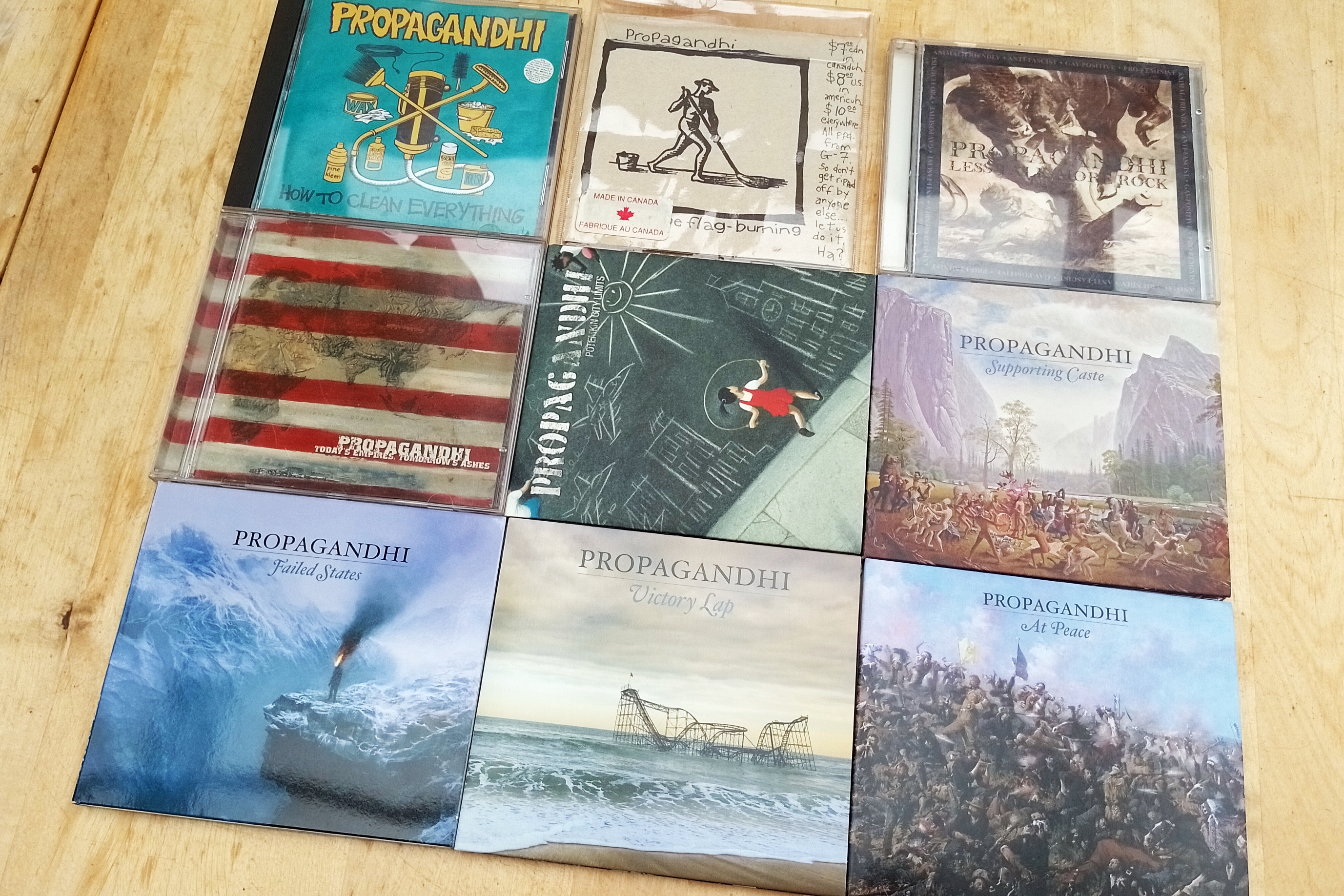
How to Clean Everything
Propagandhi are a band from Portage la Prairie in the plains of Manitoba that was formed in the late 80s by guitarist Chris Hannah and drummer Jord Samolesky over a shared interest in thrash metal and political punk. It took a while for the band to get to a point where they regularly played shows or put out any music, but eventually, with the support of bassist John K. Samson, they were discovered by none other than Fat Mike of NOFX, the owner of Fat Wreck Chords, the record label that, along with Epitaph Records, was a central force in the explosion of melodic punk in the 90s.
In 1993, they flew down to California to record their first studio album How to Clean Everything. This is considered a seminal album in the skate punk genre and one that immediately made the band household names in the scene. It's full of tightly executed songwriting and musicianship and punchy political statements, some smart, forward-looking and introspective, some juvenile and edgy. Chris' vocals are filled to the brim with performative snark that is spitting every syllable individually directly into your face, and the music is, alongside with skate punk rippers also supplemented with a couple of gimmick songs, some that would follow the band for the remainder of the career that they would quickly get tired of. As a whole, the catchy and irreverent fast melodic hardcore that didn't take itself super seriously was a pretty accurate representation of the skate punk genre at the time, but is also something they got sick of very quickly.
This early era of the band is also where I came in. Not chronologically, but in terms of what I was exposed to. In my journey of getting really invested in skate punk, I came across them early on when I picked up the label's compilation Fat Music for Fat People, which featured two of their songs from that era. And as someone looking for fast, snarky punk rock, this really fit the bill. But at the time I first came across them, the band had already long moved on, and it took me a long while to catch up to them.
Recess
Before moving to the next album though, the band had a brief stint with the indie label Recess Records, on which they put out a small handful of oddball releases. Coming out of that era is a split album with fellow Canadian hardcore band I Spy, which would foreshadow an important development for the band later on. While Recess themselves only released vinyl, this split also got a CD release through Propagandhi's own impromptu label G7 Welcoming Committee, which is probably one of the most valuable CDs I own, and is, from what I can tell, significantly harder to find than a vinyl copy. If you'd like to know more about this run of vinyl releases, coincidentally on the same day I'll be publishing this post, Greg Soden published a short article talking about them.
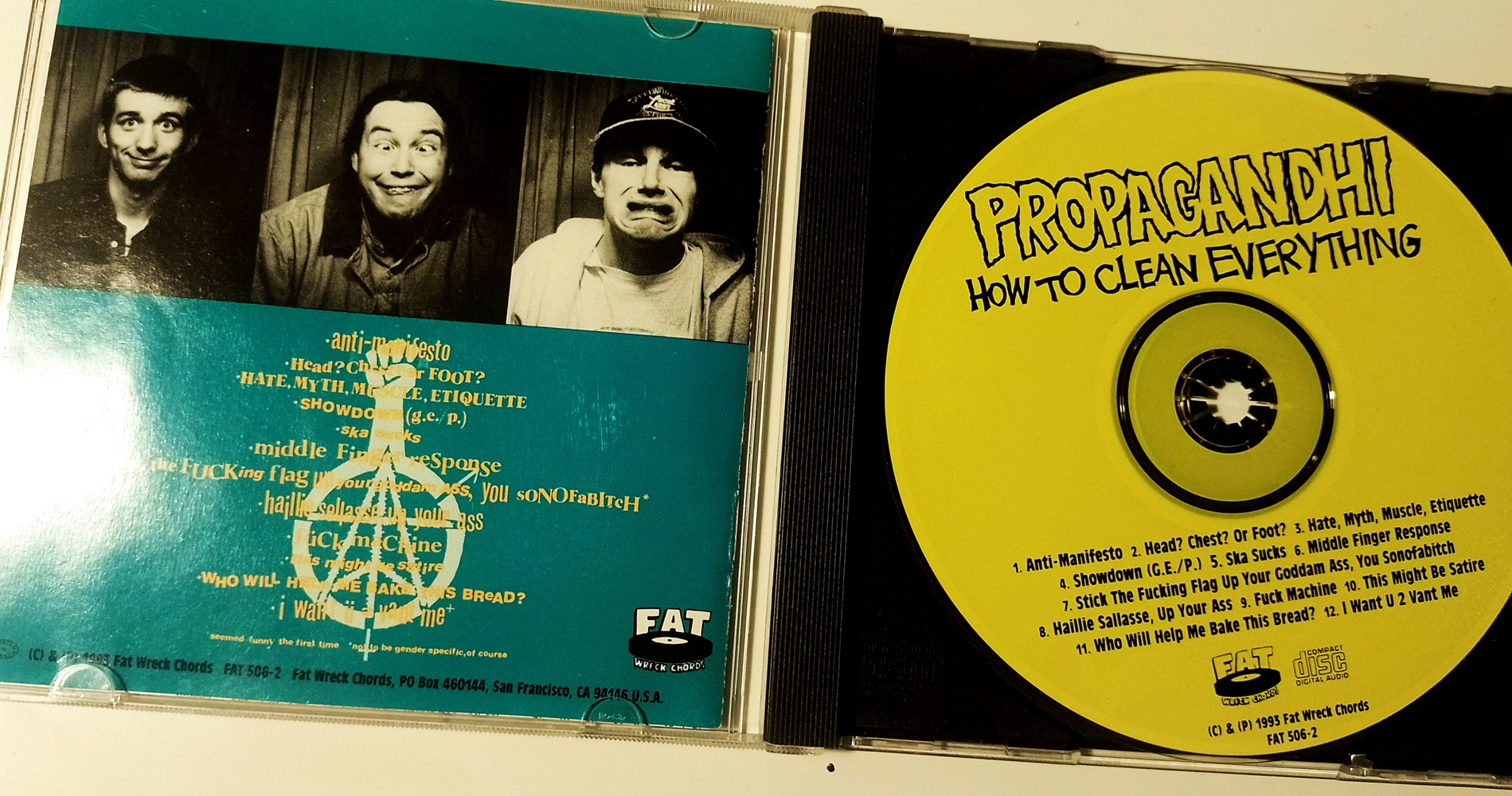
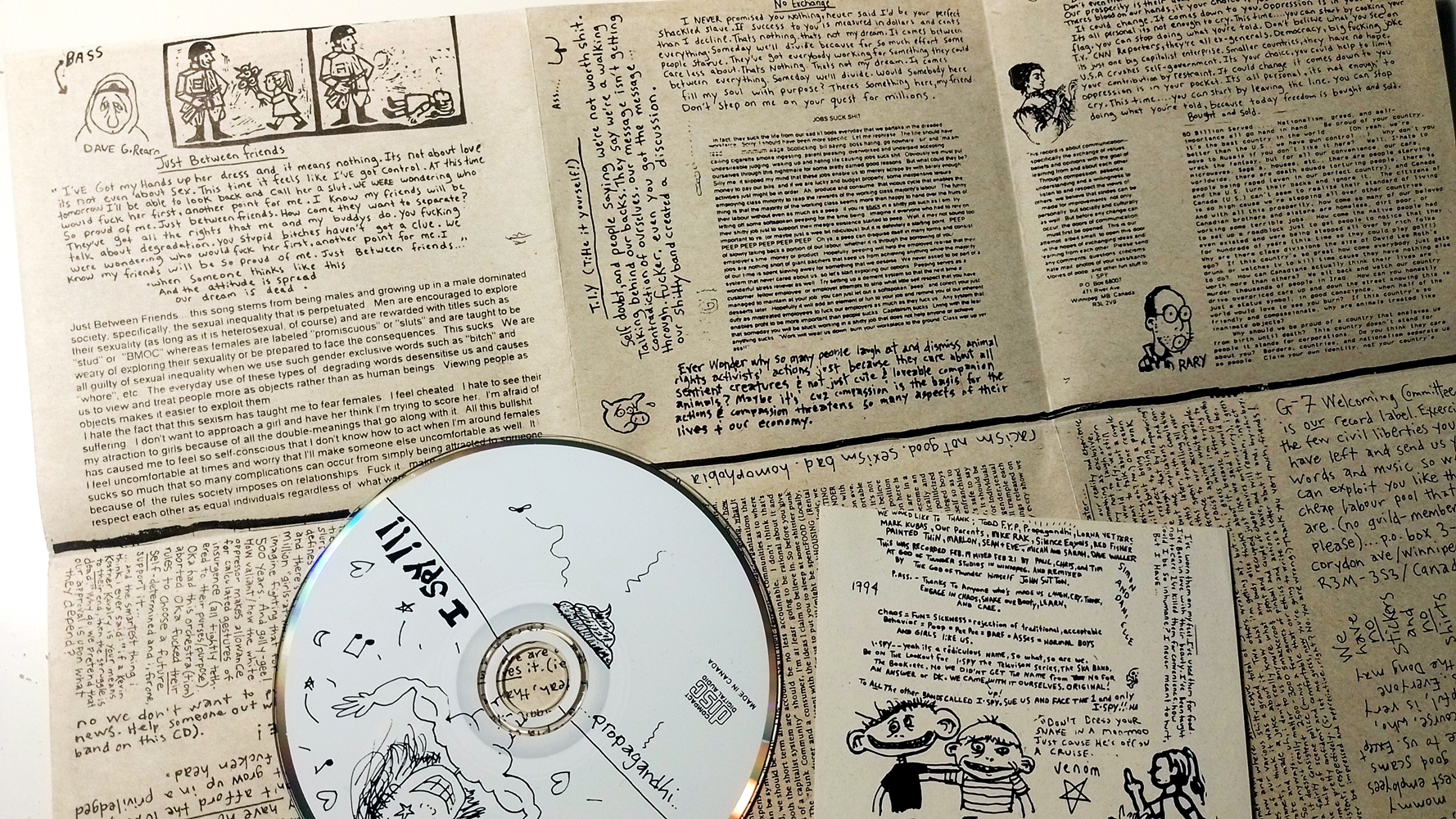
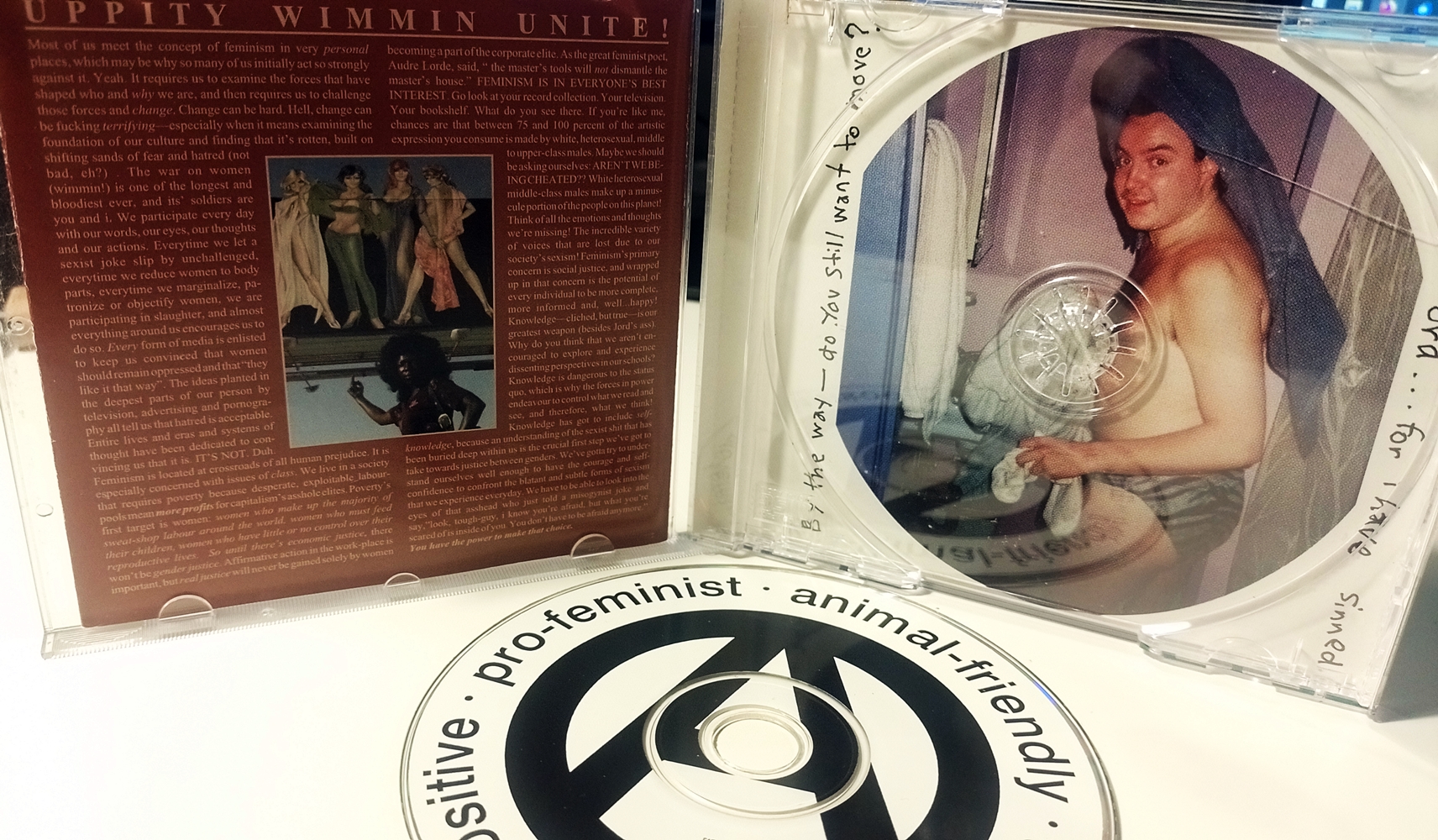
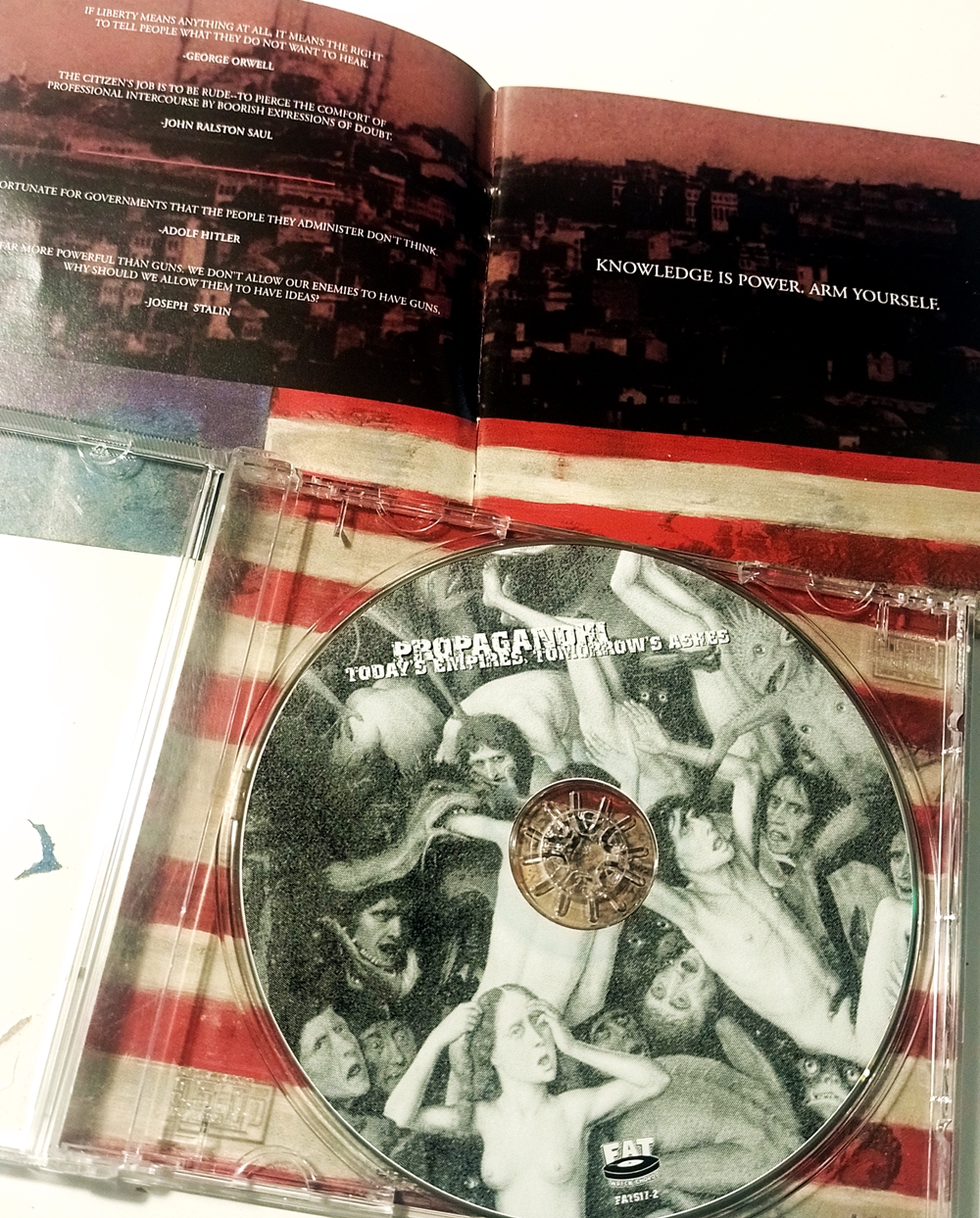
Less Talk, More Rock
Propagandhi were now suddenly royalty in a scene that they had trouble identifying with. For one, skate punk primarily happened in California, which made the whole thing geographically difficult to participate in from Manitoba, but also, this scene had its problems that the band was unwilling to compromise with, with commonplace macho bro-culture, sexism and homophobia. Punk was, and still is, for many just an excuse to act like a jackass and smash beers at shows, instead of a political movement with progressive, antiauthoritarian values. But Propagandhi had none of that. They found themselves increasingly often in conflict with their own audience that wanted to hear fast skate punk rippers but didn't care for the message they were trying to convey. In an effort to weed out their audience, they decided to become unmistakably clear and borderline insufferable. Chris became increasingly wordy, preachy and combative between songs.
Their next album, ironically titled Less Talk, More Rock released in 1996, reads "animal-friendly, anti-fascist, gay-positive, pro-feminist" around the front cover, contains tightly packed liner notes with short essays and reading lists, and some of the most aggressively and bluntly phrased songs the band has ever released. Propagandhi were not infallible though, and they knew that, so even with all the preaching and thrashing, there was space for introspection and contemplating your own place in the world: "I'll call you on your shit, please call me on mine, then we can grow together, and make this shit-hole planet better in time". The album covered a wide variety of topics, from colonialism to propaganda, from veganism to feminism.
The only exceptions to this constant, often quite academic assault were two songs, Anchorless and Gifts, written by bassist John, two personal and deeply melancholic songs full of poetic, impressionistic songwriting. They don't quite fit into the album, and it quickly became clear that this very combative Propagandhi was the wrong place for John to be. Just shortly after the release of the album, John left the band and went to form his own, in which he quickly rose to become a beloved indie rock darling under the name The Weakerthans.
Today's Empires, Tomorrow's Ashes
Chris and Jord were now again without a bassist. Luckily for them, the former collaborators I Spy had broken up the year prior, and their guitarist and main shouter Todd Kowalsky was ready to fill the spot, who would become a consistent member of the band and not just fill the spot on bass, but also become an occasional songwriter and singer.
It would take a while until a new album manifested, but when it did, it came with a bang: The first song released, which would remain a main staple of the band until today, was Back to the Motor League, a deeply jaded song about their old foe, their own punk scene. The song made it abundantly clear how much they didn't wanna have anything to do with all its shit that they might as well go back to work at the Motor League instead. While there is a lot of wit in the songwriting and many of the lines are genuinely really funny in the way it's been satirically holding up a mirror, the disgust in Chris' voice is absolutely real. This song, as well as the vast majority of the album, sounded absolutely vicious, but also catchy, infectious, unique and highly technical. The first real taste of Todd came through the straight forward hardcore track Fuck the Border, which was in a slightly different version a regular part of their live set long before it eventually appeared on track 2 of the album. Other topics represented on the album include but are not limited to imperialism, nationalism, sexual repression and animal cruelty. Not exactly light material either. This album marks a permanent shift in their approach, moving away from skate punk and increasingly embracing their thrash influences. The 2001 album Today's Empires, Tomorrow's Ashes, is faster, harder and more complicated than anything they have done up to this point, at times almost bordering on math- and grindcore. There are moments that harken back to their earlier days with melodic, fast skate punk, such as in the title track, but they are wedged in between countless face-melting rippers.
Chris, by this point, also has long left behind the artificial, nasal snark in his voice, instead singing and shouting in a more natural, lower register, which had many people at the time believe that there was a new lead singer in the band. This new vocal approach is supplemented by Todd's even more aggressive shouts he brought from his previous bands, making this is without doubt the band's fastest and in my opinion also the heaviest album. The vocal distribution is also something that makes this album unique in the band's discography, as it has a number of songs with dual vocals, where Chris and Todd trade sections back and forth between each other. On future albums, each singer would largely stick to singing the songs they wrote, while the other took a break to rest their voice, something especially Todd needed, who blew out his voice a few times when touring with Propagandhi.
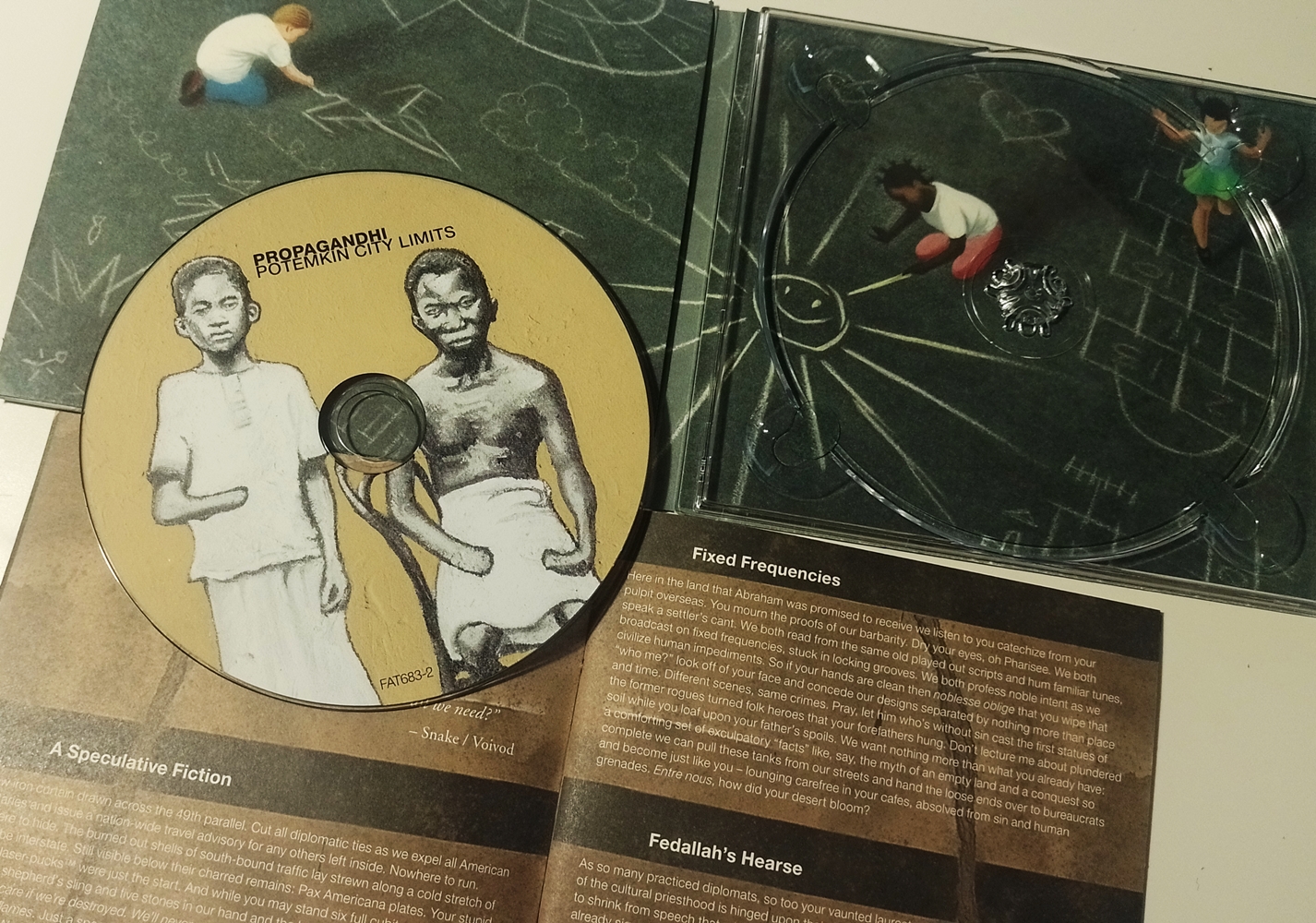
Potemkin City Limits
On their 4th album Potemkin City Limits, released in 2005, I think is where Propagandhi truly turned into the band that I love now. It's not my favourite album by any means, but to me, this is where they arrived in their niche. The songs sound grand and driving, with largely progressive, linear song structures. Chris' songwriting was more poetic and imaginative and his vocals were soaring, to a degree that would make many of these songs difficult to perform live in the future. While this album has plenty of rippers on it, they also give themselves the room to play at lower tempos and let songs sink in for a while. This marks especially a shift in Todd's songwriting style, who up until this point was more responsible for the more aggressive, straight to the point hardcore, but who now also contributes two slower, melancholic songs with Cut into the Earth with its full on rhythmically complex jazz intro, and Bringer of Greater Things, which talks about the imperialistic cruelty Canadian law enforcement inflicts upon indigenous people. By this point, also a new style of lyricism has snuck into Chris' toolbox of songwriting: The lyrics to many of the songs just appear as writing, with the sentences arbitrarily cut up to fit the meter of the music, making them more akin to prose poetry than typical song lyrics.
This album also grants them their first bit of mainstream recognition, with the scarily prophetic song A Speculative Fiction earning them the ECHO songwriting award in Canada. However, after burning more bridges with their label and its owner, the larger punk community and a final "fuck you" to the commercial excesses of the scene in the form of festivals like Warped Tour in the song Rock for Sustainable Capitalism, this would be their last album to be released through Fat Wreck Chords.
To add another facet to their artistic expression, by this point, the accompanying artwork has become a very important aspect for the band as well, and Potemkin City Limits in particular comes in a beautifully, fully illustrated digipak and detailed booklet. This album has my favourite Propagandhi artwork, with the front cover made by artist Eric Drooker, who is known for his many cover illustrations for The New Yorker and that music nerds might be familiar with from the album cover of Faith No More's King for a Day, Fool for a Lifetime. This was also the first full Propagandhi album I bought after being introduced to the band through the Fat Wreck compilations. I pretty much just picked this album at random cause the artwork spoke to me the most. I was immediately impressed by the technical proficiency, the proggy, linear song structures, and the sheer force of the guitar riffage and the driving beats, but I hadn't yet reached the point where I actually got it. From this point on, Propagandhi existed for a while at the margins of what I enjoyed, fascinating and kind of interesting, but beyond me.
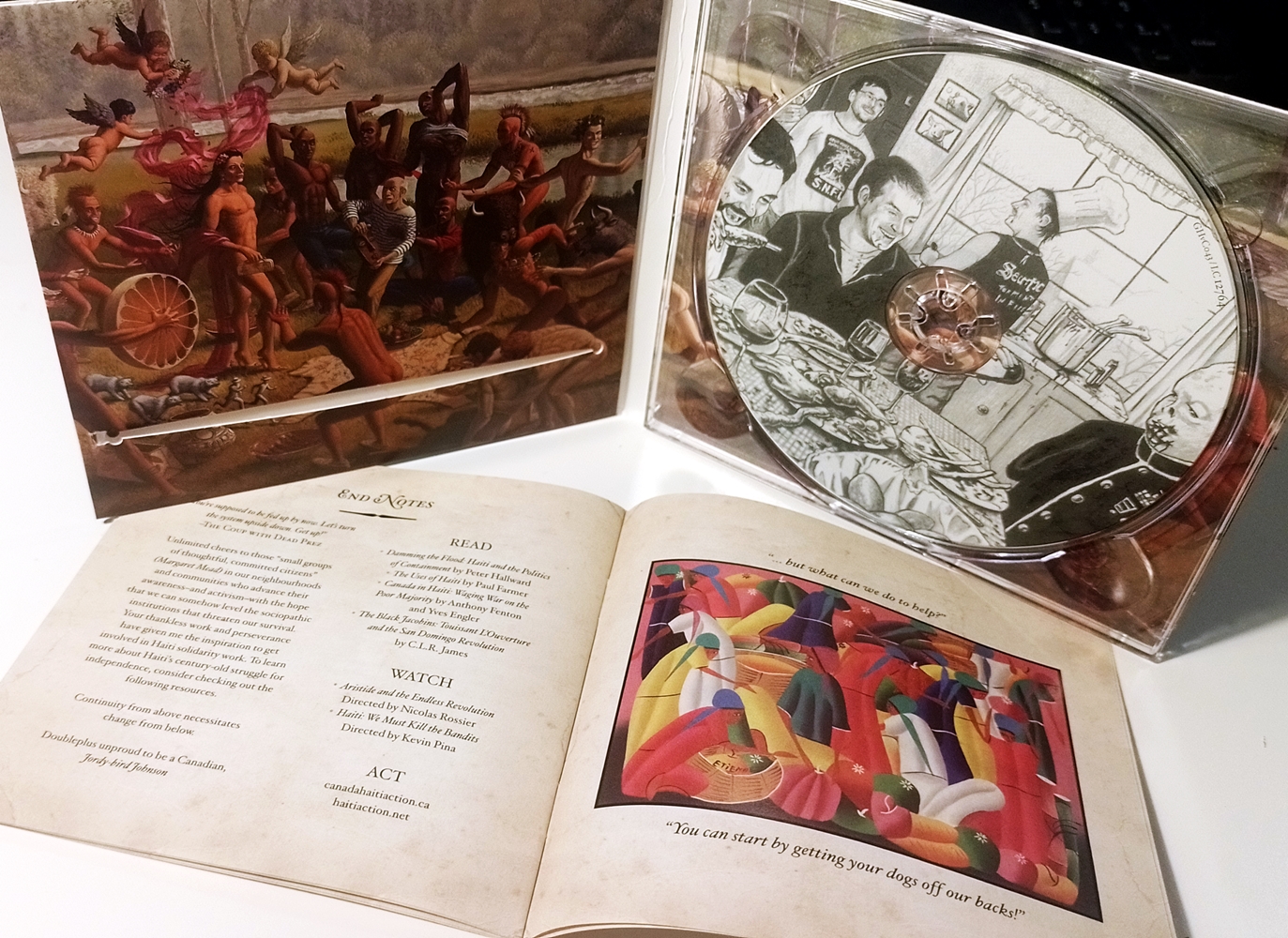
Supporting Caste
Chris needing help executing his ever more complicated guitar writing, for the first time, they recruited a 4th member to the band, who would be guitarist David "Beave" Guillas, who would bring additional prog and post-rock influences into the band. With him, they recorded their next album, Supporting Caste. The album would be released in 2009 through a variety of different record labels across the globe, the original Canadian release being put out by themselves through G7, and the German release that I own through Hamburg indie label Grand Hotel van Cleef. Because of this messy release, this album is the most difficult to get physical copies of today, but if you do, it's worth it, because the artwork, booklet and packaging is once again top notch.
This album is also my favourite of theirs. They are at the absolute top of their prog-game with complex riffage and time signatures, with Tertium Non Datur being probably the most technically challenging song they have recorded, but there's also plenty of room for melody, soul, passion, ambiance and fun. While much of the lyrics are very heavy, and frequently dealing with the deep abysses of man-made suffering, there is still a sense of cautious hope and defiance. The title track, for example, weaving its titular pun into a perhaps slightly defeatist metaphor for class struggle, ends with "If you're cast on thin ice, you may as well dance", making the song into the most beautifully poetic "fuck you, I won't do what you tell me" I've ever heard.
The songwriting has by this point also gotten increasingly personal, most notably through the inclusion of tracks like Without Love and Last Will & Testament, in which Chris processes his experiences with love, life and loss, but also political topics that previously would have been tackled more directly are now framed through a more personal lens. The fan favourite Dear Coach's Corner addresses the titular Canadian hockey broadcast for its involvement with nationalistic military propaganda that fans of the sport, such as Chris' young niece, are exposed to against their will. Todd's hardcore thrasher This Is Your Life paints a picture of reactionary politics through frustration and alienation. The track Potemkin City Limits (yes, like the previous album) tells a very emotional story of a pig that escaped a slaughterhouse and became a legend in local folklore to make a point about the cognitive dissonance needed to tolerate the continued existence of the meat industry. Now that their songwriting became increasingly poetic and introspective, ironically, the John K. Samson songs that were so ill-fitting in the 90s retroactively start to make more and more sense within the catalogue of the band as we go on.
But it's not all just doom and poetry. Human(e) Meat (The Flensing of Sandor Katz) is a direct response to a book by the titular figure that is very satirically over the top but feels like a twitter quote dunk, reminding the listener that they're still snarky, irreverent punks at heart, and The Banger's Embrace is a joyous tale of their journey to see the reunion show of one of their favourite bands, the Canadian thrash metal band Sacrifice, with whom they would record a split 7-inch a year later. I love this album a lot, and beyond the incredibly ripping and challenging music, it's just an incredibly comprehensive expression of the deeply flawed human experience to me.
Failed States
From their 2012 album Failed States to this day, they're back on a label, and it's an old familiar face, Epitaph Records. Epitaph originally sided with their colleagues in Fat Wreck Chords in the very public hostility between the band and the punk rock music industry. But now we've reached the 2010s, by which point Epitaph were releasing anything and anyone under the sun, so they took the opportunity and happily picked up the scraps.
Failed States starts, for the first time in the band's history, with a long, atmospheric slow song, the mournful and deeply bitter Note to Self. After a long build-up, it eventually settles into a driving, mid-tempo rock beat and ends in an explosive call to action. Lyrically, the song is also noteworthy, as it continues the band's path to tackle politics through the personal. Although huge parts of the song do address the dire state of the world, ultimately, the song asks "how does it make you feel?". Lotus Gait towards the end, picks back up the theme that the album started with and grapples with the trauma associated with witnessing the daily horrors of the world.
Despite a slow-burn start, the first half of the record quickly picks up the pace to a speed and intensity that rivals that of Today's Empires, Tomorrow's Ashes with some of the band's heaviest and thrashiest songs, a particular standout being Todd's Rattan Cane, a harrowing track "dedicated to the 'emos' in Iraq and the 'punks' in Aceh Indonesia". But despite all this agonizing darkness, there are some specs of light in the second half of the record. The proggy Unscripted Moment reflects Chris' feelings about fatherhood, Things I Like is fairly self explanatory, and Duplicate Keys Icaro (An Interim Report) describes an experience in an indigenous ceremony and a deep connectedness to the very fabric of the world, the latter also closing the album with some truly transcendental thrash guitar shredding.
I've often heard people say that this album sounds cold, but I feel like that's mostly the front cover's doing. The album's sound to me does reflect a brutally uncaring inhospitable terrain, but in my eyes it could just as well be described as a desolate, scorching desert if it happened to have a warm looking album cover instead of the vast, cold emptiness of icy, rocky mountain tops. In any case, I don't see this as a flaw, as the harsh sound of the album contrasts beautifully against the deeply human emotions in the songwriting and makes them shine just so much more.
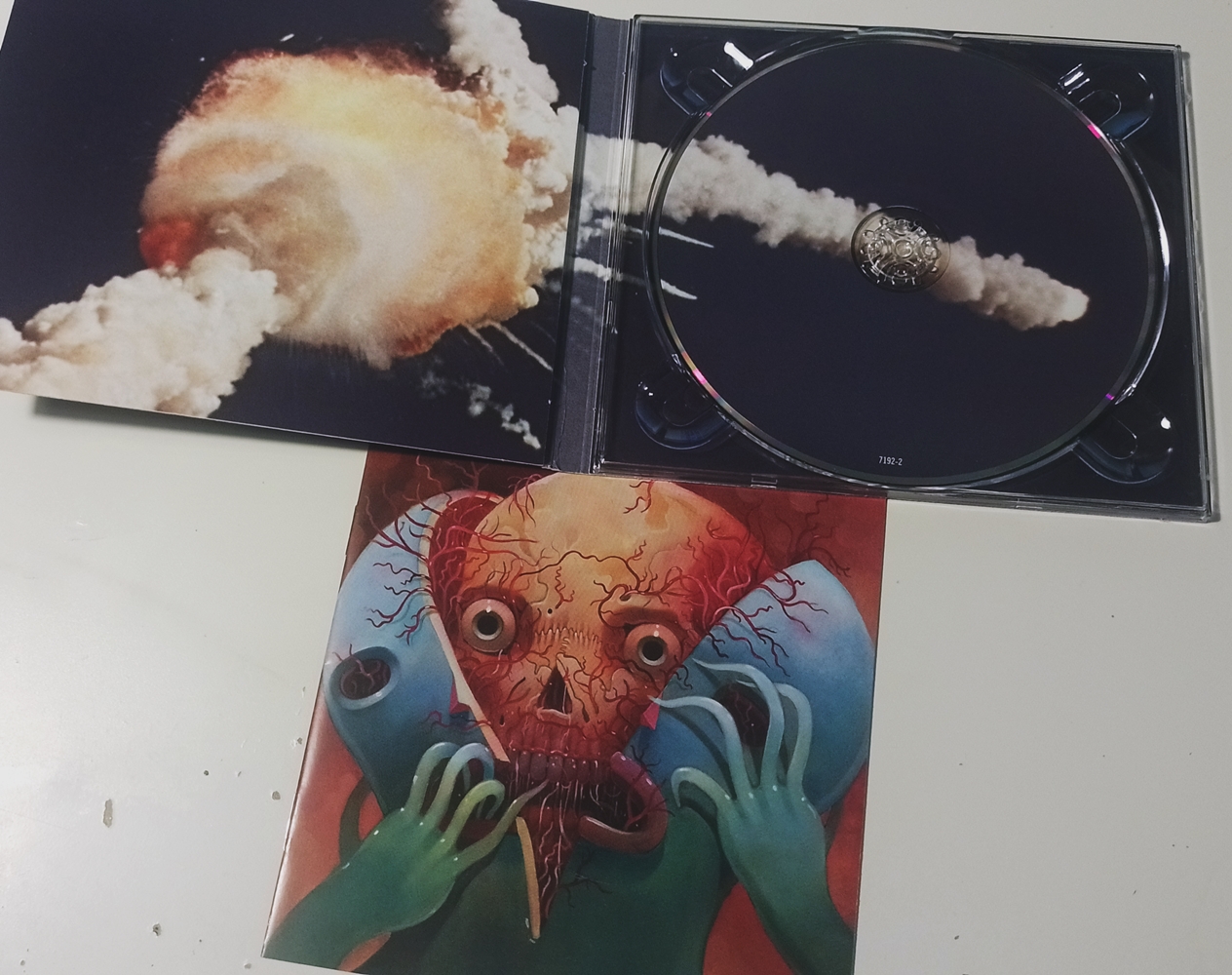
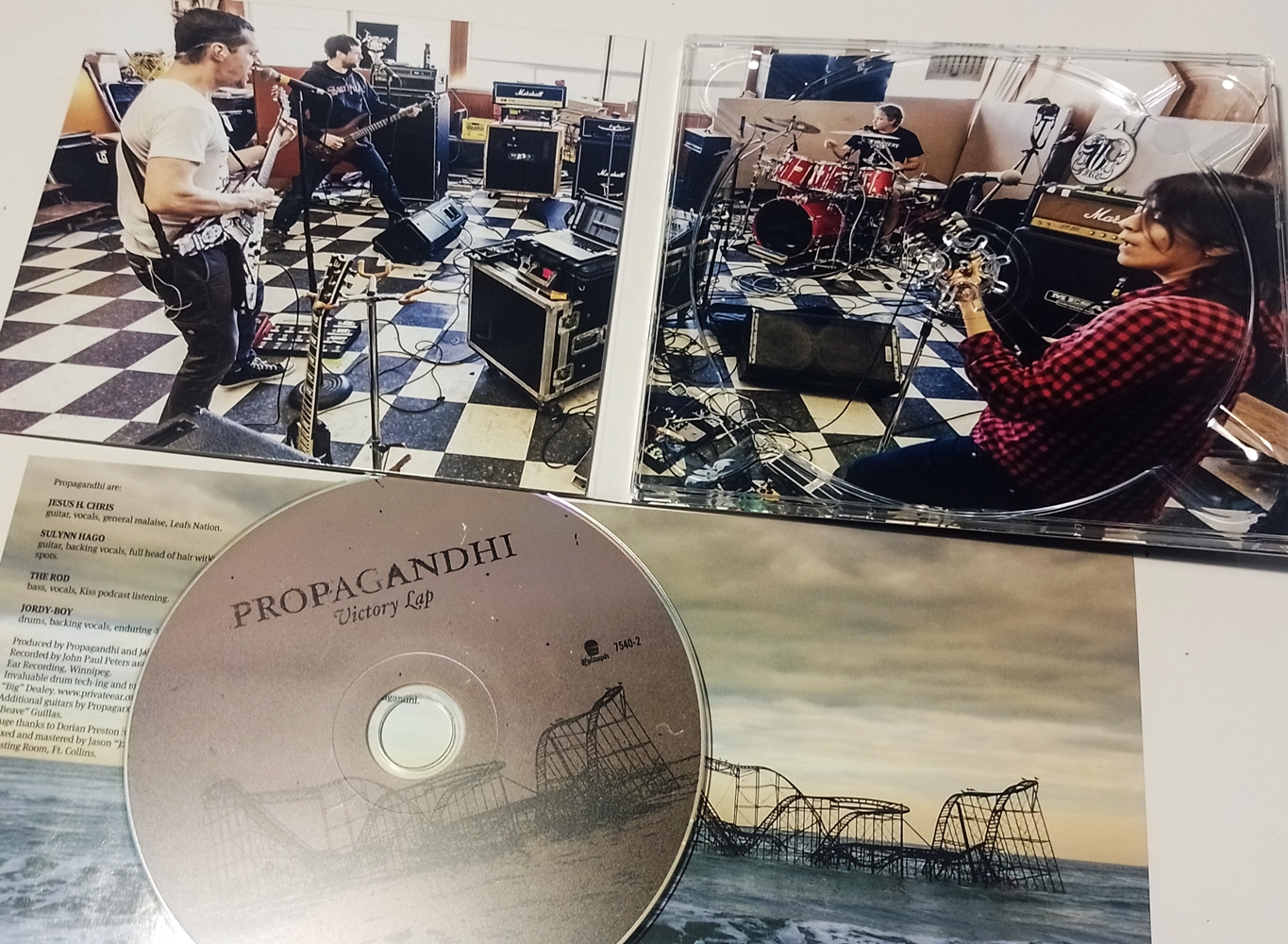
Victory Lap
At this point, Beave leaves the band to focus on his teaching career, and Propagandhi hold auditions for a new guitarist. They find Sulynn Hago, who has played in a variety of bands and runs their business as a guitar teacher. Although Sulynn is, to my knowledge, not involved in the creative process of the band and is unable to make every show and appearance of the band, they are treated as a full member, included as such in the album credits and consistent part of promotional photoshoots. In addition to helping Chris with the band's unrelenting guitar barrage, they also take over some backup vocal duties.
The 7th album released in 2017, the very sarcastically titled Victory Lap, does slow things down a notch compared to the predecessor, though. It's shreddiest moment is probably Letters to a Young Anus, a deeply bitter song in which Chris talks back to his firebrand younger self, and Comply/Resist, a satire of the colonialist beliefs of the New Atheist movement. Beyond that, the album has an extreme stylistic variance that appears to be more interested in exploring melody and the various progressive, unexpected twists and turns that went through their heads at the time. Despite the many sudden left turns these songs take, they are all quite compact, leaving you very little breathing room to get comfortably settled into a single mood or sound.
With Failed Imagineer, a gentle, melodic song about wartime trauma, the band also releases their very first music video, a beautifully shot lyric video of the band performing the song in their practice room. I think a lot about the final shot of the video that hangs on a sign on the wall with the inscription "everything is connected to everything else". More topics with the personal/political angle are Cop Just Out of Frame, that takes the scene of Vietnamese Buddhist monk's Thích Quảng Đức's self-immolation to reflect upon the impact that one can have on the world. The anthemic Lower Order (A Good Laugh) takes Chris' experience of being taken hunting as a child as an initiation into manhood to draw the line between masculinity and animal cruelty. Possibly the biggest song, one that is often cited as one of the most emotionally impactful songs Propagandhi have recorded to date, is the closer Adventures in Zoochosis. The term zoochosis describes the altered behavioral state that animals develop when living in captivity, which is used as a metaphor for the comforts we experience as a tool to make us complicit amidst all the horrors and injustices we witness, and the struggle of breaking out of it. With In Flagrante Delicto and Tartuffe, the band also addresses sexuality and gender thoroughly for the first time in a long while, the latter of which references back to Less Talk and has the band once again taking shots at the remaining macho-bro-culture in their audience. If I have any criticism of this album, it's that it only has two songs from Todd on it.
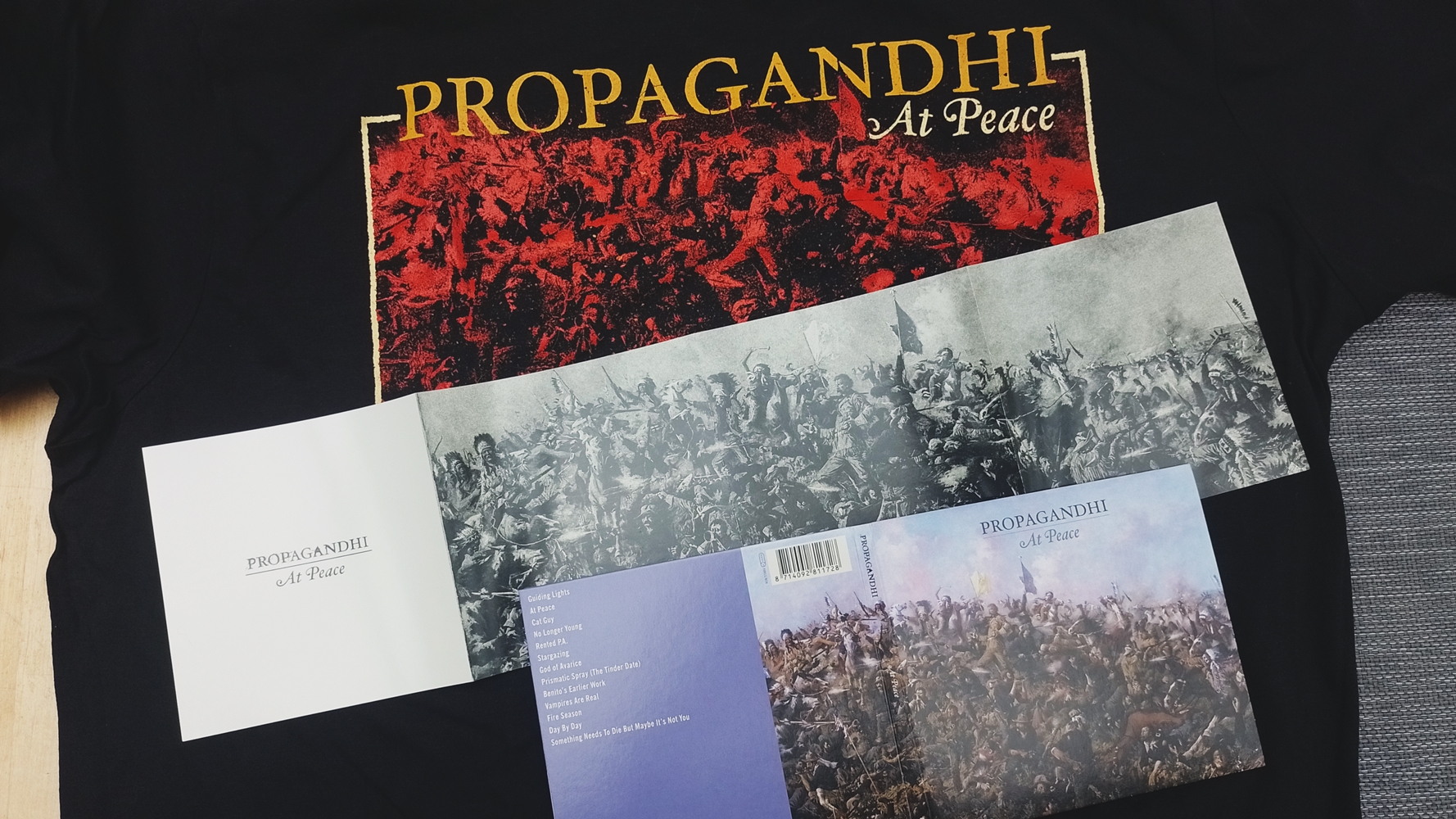
At Peace
I mentioned at the beginning that it took me a while to catch up the band from the time that I first discovered them, and that time was roughly now. Propagandhi are now one of my favourite bands, but that real deep obsession and emotional resonance only really started during the covid pandemic, at that point several years after the release of Victory Lap, which was also in part fueled by the aforementioned Greg Soden's fantastic Unscripted Moments: A Podcast about Propagandhi, that goes into absurd detail on every song with a variety of guests, from fans, to professional musicians, to academics.
Nearly seven and a half years after the last album, we finally got something new, the song At Peace, the title track for the new album to be released May 2nd 2025. At Peace is a track in the classic punk thrash vein with deeply resonant lyrics about coping with the continuous disappointment, heartbreak and anguish one experiences as a politically conscious person. As the old and tired saying goes, political hardships make for good art, and many cheered on the return of the band as just the right thing in these trying times, but it is very obvious that Chris, Todd, et al are deeply unhappy to be in this situation. In an article in Exclaim!, Chris is quoted "I have no interest in politics. I'd rather be like Judas Priest, singing about victory and some unnamed force and just having fun ripping guitar solos. If we lived in a more egalitarian society, I would be singing about pyramids and dragons and fun stuff", and yet, he's been at it, at this point for what is approaching 40 years, with no more egalitarian society in sight. The politics that surround us force themselves into our lives whether we like it or not, take over our minds and our day to day and in extreme cases, make it difficult to engage with anything else meaningfully. It wears you down.
Coping with this apparent hopelessness and trying to come up with the strength to go on regardless is a huge theme of the record, that is also reflected in No Longer Young, a melodic and melancholic Todd song, also released ahead of the full album. Since the album is still very new, I will refrain from writing a proper review of it here and will wait until later in the year when it had some time to sit. Lyrical moments that stand out to me though, are plenty. The satirically absurdist Cat Guy warns against getting caught up in purely theoretical philosophical debates that do nothing but waste your time. Prismatic Spray (The Tinder Date) is a very tongue in cheek description of a date in Disneyland in front of an apocalyptic backdrop. Vampires Are Real is about the dangers of directing experienced hurt at others, and the brooding, evocatively titled closing track Something Needs to Die but Maybe It's Not You with its abrupt ending sends you forward through the despair into the future with an encouraging nod.
Musically, too, this album is fascinating. Although the first preview for the album might suggest business as usual, this couldn't be further from the truth. The apocalyptic opener Guiding Lights immediately hits you over the head with slow, doomy guitar riffs, which in this form doesn't quite come back, but the vast majority of the album exists in the mid-tempo range with groovy and proggy heavy metal riffage. The album has tons of great moments, with catchy, emotive vocal lines, driving riffs, unexpected tempo changes, fantastic technical drumming and bass work. There's so much to chew on here, both lyrically and musically. Fire Season particularly stands out to me through it's bizarre riffage and tempo changes, and Stargazing is a wonderful experiment so completely out of left field that I can see opening up the floodgates for the band to go in whatever direction they please in the future.
I don't know if this is gonna be my favourite Propagandhi record, I am still more drawn to the fast and thrashy, but it's already got me out of breath and in tears, so this is a good sign for the Propagandhi seal of quality. I think one of the strongest aspects of this album is the high saturation of Todd songs. Although Chris is among my favourite songwriters, I prefer to think of Propagandhi as the Chris and Todd band, as the two beautifully complement each other in their voices and styles of writing, and a lack of Todd songs, like there was on Victory Lap, always screams missed potential at me, no matter how good Chris' songs are.
As far as the packaging goes, At Peace os very standard. Unfortunately, starting with Failed States, the booklets have gotten fairly barebones. As I've said, the front cover is an important aspect of the band's expression, but beyond that, the cases and booklets have not been giving you much additional writing or artwork, and are, unlike the beautiful Potemkin City Limits's booklet, printed on relatively thin, glossy paper. I still take that as a win though. In recent years, Epitaph Records, along with a variety of other labels, have issued CD releases exclusively in the absolute bare minimum of a digisleeve, thin, not fully closing on its own, and about half a centimeter shorter than a regular CD case, making them look very odd on your shelf. The golden age of sophisticated CD packaging is over. Folks just don't give a shit about CD releases anymore and investing in them seems to be largely considered a waste in resources. But this is the first Epitaph release I have seen since at least 2019 that is in a real digipack, so for once at least I don't feel like I wasted my money buying a new physical album.
Conclusion
Propagandhi have in the recent years become such a massively important band to me, not just because of their ripping, multifaceted music or their smart, poetic lyrics on important topics, but also because, in a way, I see myself reflected in their history with how I interact with art and politics. There were times where I was performatively angry and combative all the time, where I would have taken being in a constant state of outrage as a badge of honor. I used to love music that just reflected my anger and my beliefs back at me. I wanted shouts and slogans and straight forward politics in my art. And there's a time and place for that. Anger is a powerful fuel for change, and sometimes it needs clear, in-your-face slogans as part of advocacy. But is this something I enjoy? Hell no. And don't get me wrong, I haven't lost my beliefs, and I enjoy engaging with dark topics and political art. But too much punk rock that I used to love just shouts political advocacy back at me, and I'm frankly kind of bored of it. Propagandhi used to be that and they were among the smartest and most consequential with it, while having an absolutely massive impact on the scene surrounding them that is still felt today, with Less Talk, More Rock still frequently being cited as an entry point for many into a variety of progressive causes. And although this kind of political expression in music has largely lost its spark for me, Less Talk, More Rock is just so good and ahead of its time that I still hold it in extremely high regard and enjoy revisiting. But they had little interest in just restating their beliefs over and over. Less Talk was their mission statement, their manifesto, and you don't need to keep redoing that. From this point, they moved on, and increasingly started exploring the political in the personal and the personal in the political, and their beautiful prose poetry really makes me feel the emotion and humanity behind it all in a way few other bands manage to do. They allow me to still think about politics in a way I find inspiring instead of tedious and makes me feel more connected to the people around me instead of alienated. And after all, they still proudly put the Anarchist logo surrounded with "animal-friendly, anti-fascist, gay-positive, pro-feminist" from the Less Talk era somewhere on many of their physical releases. They haven't changed, and they still consequently stand for everything they once did, even if the way they express it may have changed.